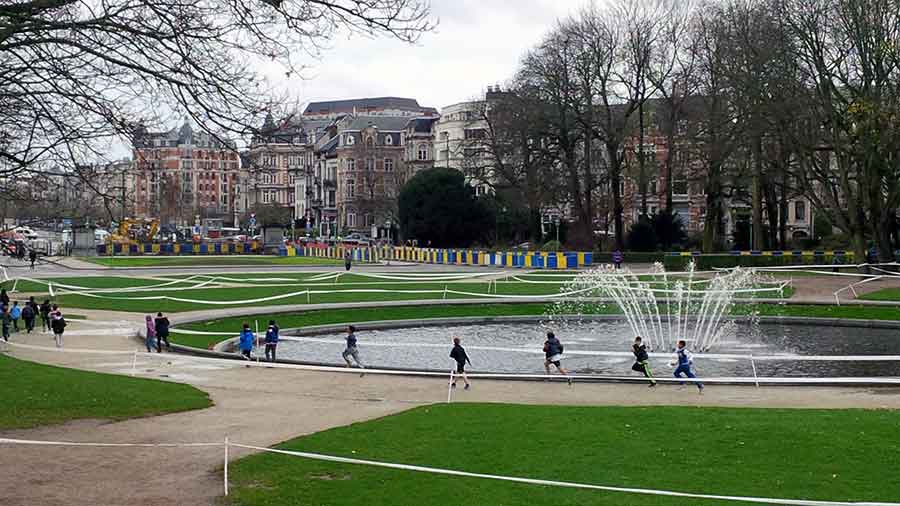Can Europe and the world beat superbugs with new antibiotics and more acronyms?

Running through Parc du Cinquantenaire Jubelpark in Brussels, on November 17, 2015. Creative Commons Attribution-ShareAlike 4.0 International Licence
Hundreds of young school pupils are running around the Parc du Cinquantenaire Jubelpark near the centre of Brussels to booming music and cheers.
Organised by Adepés (Agence de développement et de promotion de l’économie solidaire en Midi-Pyrénées),1 Dimitri Mangold explained the afternoon event for French schools in the Belgian capital was to give young people a sense of their health.
It helps them find out “if they are good about their health,” he said, “if they should run more in their life”.
The top 40 qualify for the next stage and speedy runners can consider sports teams while the slowest know they need to exercise more.
But one of the teachers, when asked about instructing the pupils about good hand washing habits, admitted, “They learn to brush their teeth but not really wash their hands.”
Less than 10 minutes walk down a gentle slope is the headquarters of the European Commission and their battle against antimicrobial resistance – AMR in science spheres and “superbugs” in more tabloid ones. It is ranked as one of the most pressing health concerns facing the world and 2014 estimates warned of a potential 10 million deaths a year by 2050 and the cost of $100 trillion to the global economy.2
Hand washing and public education are one of the pillars of the work to reduce infections and the need for antibiotics, widely dispensed like expensive candy in many corners of the world and used particularly in agriculture.
The more antibiotics used, frequently incorrectly, the more resistant infections can get, leading to multi-drug resistance (MDR) or superbugs.
“Today, gonorrhoea is a mostly resistant bacteria,” said Vytenis Andriukaitis, commissioner for health and food safety.3 “Why? Because self-treatment in very delicate situation and use of antibiotics sold on the internet and advices (sic) from people to people is a very challenging issue. We must change this misperception or all modern medicine will go back to the 19th century.”
Even though they admit the science isn’t clear, in farming, the Netherlands has managed to reduce the use of antibiotics, largely without the need for legislation, by 58 per cent between 2007 and 2014. They recognise it as another pillar of the fight to avoid a “post-antibiotic era”, where minor infections could again be deadly. The Netherlands will be pushing for more restrictions across Europe in 2016 when they take over the six-month rotating presidency of the Council of the European Union.4
Marianne Donker, deputy director of public health in the Dutch ministry of health, welfare and sport, said they were taking a “better safe than sorry” approach to build on existing antibiotic restrictions in agriculture and ones currently being considered by various levels of European bureaucracy.5
Invited by the European Commission to a seminar for journalists on AMR, Tomorrow was exposed to multiple directors and commissioners and acronyms.
IMI, IMI2, EARS-Net, CAESAR, NDM CPE, ND4BB, JPIAMR, CPME, PGEU, EPHA, TATFAR, CODEX, OIE, EFSA, EMA, EFPIA and the WHO – at least that last one most people might have heard of.
And speakers presented the European Commission’s “action plans” and plans for future action plans.6
“Stakeholders” – possibly code for jargon vampires – made pledges to back up acronyms. There was even talk of a global “Twitter conversation”.
But more revealing were the questions that went without answers or elicited responses both delicately danced on pointe and dazzling in distraction as if by a ballerina.
Why haven’t public attitudes changed significantly in much of Europe if this has been on the agenda for 20 years? “This is yet another moment to compare this to climate change. The evidence was there, what you need is willingness to tackle it,” said Xavier Prats Monné, director general of health and food safety at the European Commission.7
He also explained: “What we see in the history of medicine over the last 50 years, unfortunately the low-hanging fruits of antibiotic discovery are gone. In other words, there is actually very little chance of finding significant new of types of antibiotics that could replace existing ones from which there is resistance. In other words, research, development, innovation is of course extremely important, but this cannot be the answer. The answer has to be a combination of factors.”
So what about spending 2.5 billion euros from taxpayers towards the joint public-private partnership with the pharmaceutical industry, the Innovative Medicines Initiative (IMI), to create new antibiotics under control and could money be better used?8
In a three-minute answer, Mr Andriukaitis, punctuating his statements by hitting his hand against the desk, said: “It is really under control. This is a good example of how to develop participation of public-private partnership. All things are under control and all things are under transparency issues because we know we must be very precise in situation where you are signing agreements and following implementation. From EU side, it is only way to encourage industry to start to create new antibiotics because the last antibiotic was synthesised in 1987.”
The IMI itself insisted the public must pay for the development of new antibiotics, which will essentially be stockpiled until they are needed rather than sold for mass consumption – and then bought again by taxpayers through national health services.
And for all the effort pressing more agricultural restrictions on the use of antibiotics in Europe, what is the point if the secretive TTIP (Transatlantic Trade and Investment Partnership) is signed with the US where a majority of livestock are given antibiotics?
“I’m sure you will excuse me if don’t speculate about TTIP,” Ms Donker told a reporter from Cyprus who pressed the point. “That’s it?” she was asked. “Yes, that’s it.”
Michael Scannell, director of the food and veterinary office at the European Commission, came to her rescue and added: “We already agreed that Europe will not sacrifice its high levels of consumer protection and health safety in a TTIP context. And the EU is already engaged with the US in a transatlantic task force on antimicrobial resistance. The US itself is taking AMR increasingly seriously.”

A European Union doesn’t necessarily deliver uniform policies across all member states. Creative Commons Attribution-ShareAlike 4.0 International Licence.
Regulations, legislation, memoranda, communiques, policy documents, time tables, and perhaps more paperwork and layers than there are acronyms. Despite that, there is dramatic variation from one country to another in antibiotic use and resistance to those antibiotics. And global travel makes borders mean little to bugs or superbugs.
“Unless there is a real formation of a global coalition to deal with this issue, we will not be able to get a handle on the problem, or at least not within the timeframes that we need to do it,” warned Martin Seychell, deputy director general of the health and food safety directorate, responding to another question about TTIP.9
This year marked the first “World Antibiotic Awareness Week” (November 16-22) to coincide with the eighth European awareness day.10
“All sectors must be together – farmers, environmentalists, veterinary sector, doctors, health care workers,” insisted Mr Andriukaitis, still punctuating with his hand.
“We must act every year to raise those questions. We must send a message that antibiotics are a very dangerous weapon.”
All the bureaucratic language and titles may matter little if young people don’t keep running in the park – and washing their hands.
This work is licensed under the Creative Commons Attribution-ShareAlike 4.0 International Licence.
CORE PRINCIPLES APPLIED
No relevant issues on principles 1, 2, 4, 5, 7, 8, 9, 10 or 11.
3 and 6. Independence and accountability, and A duty to openness: The European Journalism Centre, an organisation funded by the European Union, invited Tristan Stewart-Robertson to attend the seminar in Brussels, paid for by the European Commission. No guarantee of news stories or their content was made and neither organisation has seen or influenced any of this reporting. As the EC is taxpayer funded, the trip cost the following:
- Return flights from Glasgow to Brussels: 428.86 euros
- Accommodation: Approximately 240 euros (specific cost has been requested)
- Meals: Specific cost has been requested
- Printed material about AMR and a USB stick (made in China, imported by a Spanish firm) were provided.
- http://www.adepes.org/ ↩
- Figures from the O’Neill review in the UK, first reporting in 2014 and expected to publish further advice on the problem in 2016. ↩
- Profile page and press statement from Mr Andriukaitis. ↩
- A website for their presidency is empty at time of publication. ↩
- Department details and Powerpoint presentation to journalists. Q&A on the proposed regulations from 2014. ↩
- Powerpoint presentation about the current action plan that expires at the end of 2015. ↩
- Mr Prats Monné press release and Powerpoint presentation. ↩
- Statements about accountability from the IMI website. ↩
- Directorate website. ↩
- European awareness day and world week. ↩


